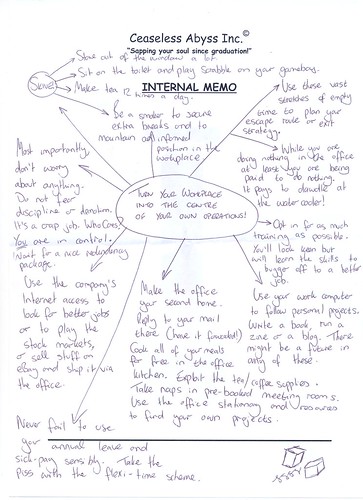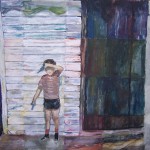Loath as I am to be the boring git at the cocktail party, allow me report upon the dream I had last night.
I should point out first of all that this event is notable in that Robert Wringham DOES NOT DREAM. Or if he does dream, he seldom remembers doing so. I assume it’s something to do with being a fictional person. If real people dream up bizarre fictions between the sheets, a pixie such as myself would probably dream factual events. We can’t have any more bridges connecting the realms of the real and the not real. I already have several paranoid theories about how my actions are to blame for causing 9/11.*
The dream begins on Edinburgh’s High Street: a place I know very well having spent large portions of my life there. I walk down one of the sloped alleyways to where (in reality) there is a popular pub called the Jolly Judge but now (in the dream) is a strange medieval tavern.
As I open the door, smoke fills out into the alley. I note the strangeness of this. There is supposed to be a smoking ban. (Not even my dreams are safe from the legislation of the superego).
To my horror, a Queen tribute band is coming to the end of their set on a slightly raised platform of a stage. I don’t know much about Queen but they are doing that dreadful number which starts “one dream, one love, one tired decision” or something.
A bouncer tells me that it is their second encore and that they will be leaving shortly.
“A Queen Tribute band?” I spit angrily, “what were you thinking, dick head?”
Apparently my dream self knows the bouncer to be the organiser of the event. It seems we have a history. He does not appear perturbed at being called a dick head.
The reason for my anger? I am here to perform my own one-man Queen tribute band. I can’t believe how inappropriate this scheduling is.
Equipped only with a snare drum and a stick-on Freddy Mercury mustache, I don’t know how I am supposed to succeed in this task but my dream self doesn’t seem to mind. It’s comedy apparently.
The four-piece band don’t seem to have made any effort with their costumes either. There’s not a Brian May wig in sight and the denim-clad lead singer looks more like Tommy Saxondale than Freddy Mercury. I don’t think a single one of them is gay either. But their music is good. They sound exactly like Queen and the audience love it.
The sense of trepidation sets in. I could feel dream butterflies in my dream stomach. Oh, for a dream lepidopterist with a dream endoscope. How can I follow these talented musicians with my Early-Learning-Centre drum and my joke shop tache?
The Plain people of Cyberspace: Maybe it will work. Maybe it will be so embarrassing and you will look so wretched that it will be brilliant. You could be the next Tommy Cooper or Ted Chippington.
Me: That’s what I hoped for too. But the crowd had come for music and they were drunk on whatever medieval drinks the bar staff were serving in those tankards and animal skulls and I really wasn’t sure I would cope with this.
It seems there is to be a five-minute intermission between acts. An MC in a lime green suit and a string of French onions about his neck boards the stage and tells them that “if you liked that, you’ll love our next act”.
The drummer of the Queen band comes over to talk to me. He asks me what he thinks I’m doing, doing a Queen tribute. He looks like a young Bill Oddey with a sweaty fringe combed down over half of his face. He is annoyed.
“We’re the only Queen tribute band at the festival this year,”. I can tell he is irritated. The last thing I want is to get involved with an 80s tribute band mafia.
“Don’t worry,” I say, “This is just a one-man comedy thing. I’m covering for Mitch Benn. It’s nothing like yours and he’s been doing this for years.”
I love how my sleeping mind dropped in this piece of rationale to help explain why I had embarked upon this odd project. I was friends with musical comedian Mitch Benn in this dream and the Queen gig was a favour for him.
In reality, I once met Mitch Benn at a gig above the Wolverhampton Varsity. He sold me one of his ‘Radioface’ CDs for half the sales price. Perhaps stepping in for him at the Queen gig (in reality he doesn’t do this, I don’t think) was recompense for this. Still, this seems like a high payment for a £5 CD discount from five years ago.
Back in the waking world, I’m still annoyed at Mitch Benn for putting me in this position. If anyone sees him, kick his ass for me. And then pretend that you thought he was Bill Baily. He’ll hate that.
I wish I could conclude this description with an explanation of how the dream ended, but alas, my mind wondered before I could perform my one-man tribute to AIDs and I swam into a far more disturbing scenario with some dancing bears. My mind is a disgusting place to be.
The meaning behind this dream? In March 2008 I will have my very own one-man comedy show at the Glasgow Panopticon. Among other things I will be reading entries from this blog and improvising a diary entry live on stage. There will be a snare drum involved (but no mustache that I can think of). I guess the dream is a symptom of feeling slightly unprepared for this and of relying on other people (theatre managers, technicians, musicians, promoters) for the first time in a long while. I know it will all be fine and that I’ve got an entire six months to sort things out but when I think about it too carefully I do a runny poo.
* “… theories about how I am to blame for 9/11”. Yes indeed. The main one concerns how I failed to flick the bathroom light switches 27 times on the evening of 9/10. Another involves a punishment for touching myself during Her Majesty’s Christmas speech in 1997.



